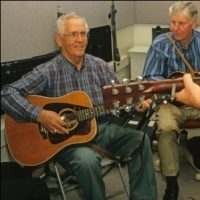
Paul Sutphin
Paul Sutphin was one of the of the musicians whose playing most exemplified the famous driving sound of Round Peak string band music in the twentieth century. Raised in the Round Peak section of Surry County, not far from Mount Airy, Sutphin was one of twelve siblings, and part of a community where music-making was an integral part of life.
He described Round Peak as “a poor community” that had to create its own entertainment when he was a child. “A lot of fellows had them a banjo, and they’d sit around tobacco barns at night and go to playing. And on Christmas Day they’d have an all-day-long dance. And they’d make music, and I’d stand and watch them old men breaking up Christmas.”
When he was a teenager, Sutphin learned that a neighbor was selling his guitar for four dollars. He spent three weeks clearing brush from a creek bed, hard labor that earned him five dollars. He bought the guitar, and gave the remaining dollar to his father. Sutphin received instruction from a local musician, Oscar Jarrell, and over the years developed his own distinctive two-finger style of backup guitar playing. Though he was a masterful musician, he joked modestly, “Get it in really good tune, get good timing, and you’ve got it two-thirds whipped.”
Paul Sutphin was a crucial part of two of the most important bands in the history of Round Peak music, the Camp Creek Boys, and the Smokey Valley Boys. With bandmates Kyle Creed, Fred Cockerham, Earnest East, Verlen Clifton, and Benton Flippen, among others, he made now-legendary recordings, and collected countless titles in band contests. Friend and band mate Paul Brown remembered the vital, energizing contribution to a band’s sound that came from Sutphin’s festive spirit. “Playing in a band with Paul [Sutphin] was a unique experience to say the least. . . He would often choose the songs and tunes as we went along. He would call out breaks if he wanted us to take them. But more than anything else, he would infuse the performance with a focused energy, intensity and happiness that drove the rest of us to play harder and better than we thought we could.”


